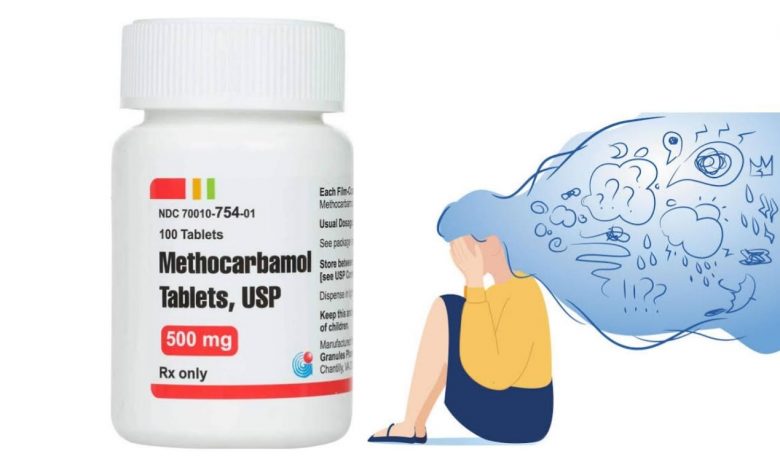How Effective Is Methocarbamol For Anxiety?

According to the American Psychological Association (APA), anxiety is an emotion characterized by feelings of tension, worried thoughts, and physical changes like increased blood pressure. Knowing the difference between normal feelings of anxiety and an anxiety disorder requiring medical attention can help a person identify and treat the condition.
The duration or severity of an anxious feeling can sometimes be out of proportion to the original trigger, or stressor. Physical symptoms, such as increased blood pressure and nausea, may also develop. These responses move beyond anxiety into an anxiety disorder.
The APA describes a person with anxiety disorder as “having recurring intrusive thoughts or concerns.” Once anxiety reaches the stage of a disorder, it can interfere with daily function.
While a number of different diagnoses constitute anxiety disorders, the symptoms of a generalized anxiety disorder (GAD) will often include the following:
• restlessness, and a feeling of being “on-edge”
• uncontrollable feelings of worry
• increased irritability
• concentration difficulties
• sleep difficulties, such as problems in falling or staying asleep
While these symptoms might be normal to experience in daily life, people with GAD will experience them at persistent or extreme levels. GAD may present as vague, unsettling worry or more severe anxiety that disrupts day-to-day living.
What is Methocarbamol?
Methocarbamol is a medication used with rest, physical therapy, and other measures to relax muscles and relieve pain and discomfort caused by strains, sprains, and other muscle injuries.
How it works
Methocarbamol is in a class of medications called muscle relaxants. It works by slowing activity in the nervous system to allow the body to relax. It’s thought that this drug decreases your body’s messages of pain and slows down your nervous system. This relaxes your muscles and provides pain relief.
Generally, following oral administration, the effects of methocarbamol kick in after about 30 minutes. However, the amount of time it takes for methocarbamol to start working can also vary from person to person.
How effective is Methocarbamol for anxiety?
Although methocarbamol is not an antianxiety medication but a muscle relaxant, it has been shown to be helpful to people with anxiety disorders. Experiencing frequent feelings of fear, worry, and anxiety can impact the body by contributing to muscle pain and tightness.
Anxiety causes the muscles to tense up, which can lead to pain and stiffness in almost any area of the body. Muscle tension is also a common problem for people with panic disorder.
The effects of methocarbamol can help you relax tense muscles, which can make you feel better and help you cope with anxiety. Euphoria, otherwise known as a “high” feeling, isn’t a known side effect of methocarbamol.
Anxiety can intrude on thoughts and activities, and sometimes it’s hard to make anxiety go away. These feelings of anxiety and panic can interfere with daily activities and be difficult to control. They are out of proportion to the actual danger and can cause you to avoid places or situations.
You should see your health care provider if your anxiety is affecting your life and relationships. Your provider can help rule out any underlying physical health issue before seeing a mental health professional.
While most people with anxiety disorders need psychotherapy or medications to get anxiety under control, lifestyle changes and coping strategies also can make a difference.
Here are 11 tips for coping with an anxiety disorder according to Mayo Clinic:
1. Keep physically active: Develop a routine so that you’re physically active most days of the week. Exercise is a powerful stress reducer. It can improve your mood and help you stay healthy. Start out slowly, and gradually increase the amount and intensity of your activities.
2. Avoid alcohol and recreational drugs: These substances can cause or worsen anxiety. If you can’t quit on your own, see your health care provider or find a support group to help you.
3. Quit smoking, and cut back or quit drinking caffeinated beverages: Nicotine and caffeine can worsen anxiety.
4. Use stress management and relaxation techniques: Visualization techniques, meditation, and yoga are examples of relaxation techniques that can ease anxiety.
5. Make sleep a priority: Do what you can to make sure you’re getting enough sleep to feel rested. If you aren’t sleeping well, talk with your health care provider.
6. Eat healthy foods: A healthy diet that incorporates vegetables, fruits, whole grains, and fish may be linked to reduced anxiety, but more research is needed.
7. Learn about your disorder: Talk to your health care provider to find out what might be causing your specific condition and what treatments might be best for you. Involve your family and friends, and ask for their support.
8. Stick to your treatment plan: Take medications as directed. Keep therapy appointments and complete any assignments your therapist gives. Consistency can make a big difference, especially when it comes to taking your medication.
9. Identify triggers: Learn what situations or actions cause you stress or increase your anxiety. Practice the strategies you developed with your mental health provider so you’re ready to deal with anxious feelings in these situations.
10. Keep a journal: Keeping track of your personal life can help you and your mental health provider identify what’s causing you stress and what seems to help you feel better.
11. Socialize: Don’t let worries isolate you from loved ones or activities.
Your worries may not go away on their own, and they may worsen over time if you don’t seek help. See your health care provider or a mental health provider before your anxiety worsens. It’s easier to treat if you get help early.





